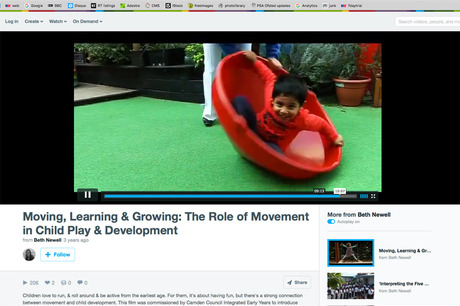
We asked child development experts to comb the internet for their top – free – child development resources. Below is a selection from the likes of Harvard and Warwick Universities and the Chicago-based Erikson Institute, which specialises in child development.
EUNICE LUMSDEN
Head of early years, University of Northampton.
Babies in Mind
This online course by Warwick University is a must for all working in the early years. It helps practitioners to understand the importance of attachment and the vital role of adults in this area.
www.futurelearn.com/courses/babies-in-mind
Three Core Concepts in Early Development. Harvard University
These two-minute videos provide an excellent introduction to support understanding of the importance of early interactions for developing the brain. They can be used in a variety of ways, e.g. to support those new to early years practice to understand the importance of why every interaction counts with babies and young children; and to promote discussion and further reading depending on level of study.
http://developingchild.harvard.edu/resources/three-core-concepts-in-early-development
InBrief: The Science of Resilience. Harvard University
Resilience is a term that is growing in use without people always understanding what it means. This video can be used in several ways – as an introduction but also to promote discussion and further reading. The overall idea should be to reflect and develop setting practice that promotes resilience in young children.
http://developingchild.harvard.edu/resources/inbrief-the-science-of-resilience
Should Sarah Smack her Child?
This tool explores the ethical dilemmas of smacking and enables safeguarding policies to be brought to life.
www.nottingham.ac.uk/nursing/sonet/rlos/sociology/sarah/
All It Takes is H.E.A.R.T.
From the Erikson Institute in the US. A message that settings can share with parents/carers and staff: quality interactions are key to healthy brain development.
www.youtube.com/watch?v=tpeBlz1ec18&app=desktop
LALA MANNERS
Director of training consultancy Active Matters, www.activematters.org.
Physical development resources
Excellent resources for EY physical activity – very accessible and useable; look under ‘Active Movement’:
The best ‘ages and stages’ information I have come across. They are known primarily for car safety initiatives – but worth browsing other materials here:
Useful resources for physical activity – look under ‘Move with Me’ – all downloadable, very clear and concise:
Gill Connell is well-known for her work in physical development in the early years. This site provides much-needed resources and information and useful blogs:
Primarily aimed at older children on the autism spectrum – but all these resources are adaptable for early years:
JULIA MANNING-MORTON
Independent consultant, trainer and author.
TED Talks, Harvard University
1. Alison Gopnik: ‘What do babies think?’
www.ted.com/talks/alison_gopnik_what_do_babies_think?language=en
2. Laura Schulz: ‘The surprisingly logical minds of babies’
www.ted.com/talks/laura_schulz_the_surprisingly_logical_minds_of_babies
Meet the experts
Education Scotland has produced a series of filmed conversations with experts, which include Robin Balbernie, Professor Aline-Wendy Dunlop, Professor Colwyn Trevarthen and Dr Rosie Roberts.
Developmental movement
Camden Council’s DVD, Moving, Learning & Growing: The Role of Movement in Child Play & Development, can be purchased but clips are free at:
LAURA HENRY
Early years consultant, who runs her own child development training courses, www.laurahenryconsultancy.com
How children explore the world
See how children learn and develop in a variety of contexts by clicking on a nursery to explore different areas such as ‘puddle’, ‘clothes pegs’ or ‘cake’.
These clips, from Zurich State Department of Education, could be watched in a professional development session, with the clips paused and questions asked such as: ‘what does this clip tell you about babies?’ ‘What does this clip mean for your practice?’ ‘Can you think what you might change to support babies’ learning and development?’ ‘What might you share with parents to support the teaching and learning within the home environment?’
These clips could also be used during a parent workshop to illustrate how children learn and develop.
Developmental norms
This free resource was developed by Northern Ireland Social Care Council, Queens University of Belfast and the University of Ulster. It provides information on child developmental norms of birth to six-year-olds.
www.nicma.org/cms/press-releases/496-new-mobile-learning-app--child-development-0-6-years
Nursery World is holding a one-day conference on self-regulation and executive function on 30 June. Speakers include Clancy Blair, professor of cognitive psychology at New York University. More information can be found at: www.selfregulation.co.uk










